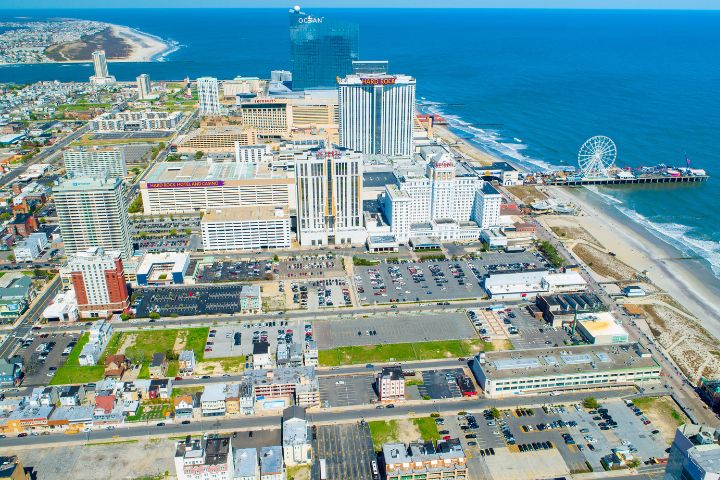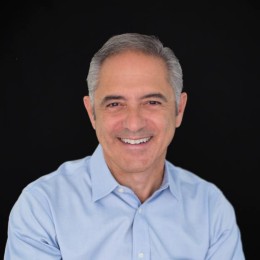Leader Interview
Leader Interview: Anthony Catanoso,
Principal, Steel Pier
Jane Bokunewicz (JB): Hello, everyone. Welcome to the LIGHTs On Leader Interview presented by the Lloyd D. Levenson Institute of Gaming, Hospitality and Tourism at Stockton University. My name is Jane Bokunewicz, and I'm the faculty director of LIGHT. I'm joined today by Anthony Catanoso, who is the owner and operator of the famous Steel Pier in Atlantic City. Thank you, Anthony, for doing this with us.
Anthony Catanoso (AC): Good morning. Thanks for having me, Jane.
JB: I'm going to ask you a really broad question, and you can answer it any way you'd like. Who is Anthony Catanoso?
AC: Well, I am a local businessman in Atlantic City. My background has been in the political arena, insurance and then ultimately the amusement business with my brothers Bill and Chuck and my partner, Ed Olwell.
AC: We started out in the insurance business years ago and started specializing in amusement insurance. Then we eventually teamed up with some partners to start building amusement attractions. We found our way to Steel Pier back in 1992.
We were able to make a deal with Donald Trump back then, who owned the pier, for a two-year lease. We wound up, staying in a one- and two-year lease set up with him for 20 years, until we bought it back in 2011.
Anthony Catanoso,
Principal, Steel Pier
JB: Excellent. Wow!
What would you consider your greatest current challenge or current success?
AC: The challenge side of it is the economic impact. The impact that the economy has on our client base. If things are tight. If gas prices are high. If inflation is high. It affects their disposable income and their discretionary income when it comes to travel and entertainment.
That's a challenge, and it has been a challenge in the past.
Also, weather's been a challenge the last few years, but this year, especially. Heat during the day - pop up showers at night. It's almost like a Miami-type forecast every week.
Even if the rain doesn't come, the forecast keeps people at bay. You get forecasted out as much as you get rained out in our business, which is challenging.
The other thing is labor costs. Labor costs have gone up exponentially in the last three or four years. What once used to be a $7-8 minimum wage is now $15-16 for, let's say, a high school kid that's running a ride. It's expensive, and you cannot pass all those costs onto your customer. And you have tax issues.
They're the challenges. And that's something that we deal with every day. We try to mitigate as best we can without hitting the customer in the pocketbook, because they're already, struggling to get there, whether it be gas or overall income limits.
We have to be careful, and we have to create a balance.
JB: Just a question as a follow up? Did the increase in the minimum wage? Did that help you to attract employees? Because I know several years ago it was hard to find employees. Has that helped in that regard?
AC: Here's the unique thing. We never had trouble attracting employees because we employ a lot of local kids. They love to come to work in an amusement park, run rides, work games, work in the food stands. We never had a problem. Always had an abundance.
And then we always had a great gap filler with the J-1 [Visa] students
There used to be a time where we had as many as 140 J-1 [Visa] students through the course of the summer. Now, we're at about 80.
The [J-1 Visa] program is excellent. It's an excellent program for not only us, but for every shore community.
We never had a problem [filling positions]. All that that minimum wage did was cost us a lot of money to the bottom line.
JB: Any success stories in recent years that you can share with us?
AC: We've always prided ourselves on being able to bring new attractions to the market. In several cases we would introduce a new ride or attraction to the United States, but in a few cases the world.
For instance, we had the first slingshot or reverse ejection seat that had no rubber. It was all steel cables and springs. We introduced that to the world. We were the first one to operate in Atlantic City.
Our spinning coaster. In 1996 we introduced the Crazy Mouse spinning coaster, which is the first spinning coaster ever, and we just replaced that with a brand new one. Instead of the Crazy Mouse, we call it the Crazy Crab. It's a different theme, but it's another beautiful spinning coaster that just opened this year.
In order to compete with the bigger regional parks, we're a mom-and-pop park, we pride ourselves on new technology for rides and attractions. We bring those [new] rides and attractions in every couple of years.
That's been our success now.
And the other thing. We have a very unique situation because we're 1,000 feet out of the ocean.
We've got one of the most unique properties in the United States...."
We've got one of the most unique properties in the United States. And it's an attraction. I mean, we're an iconic 127-year-old brand, Steel Pier. So that that helps us tremendously. We're very proud of that.
JB: Excellent. The next question is,how have you seen Atlantic City evolve over the years? What's different from many years ago? You've been here in this area for a while. What's different? What's the same as maybe 10 years ago.
AC: When we came to Atlantic City back in 1992, there were 44 million visitors a year because of the gaming aspect. That basically has dwindled down to 25 million [visitors annually].
That has a huge impact. I don't care what business you're in. You're going to feel the effect if your population, your visitation gets cut in half.
That was simply because of the evolving competitive gaming markets in the area.
Back in 1994, when New Jersey had a chance to do sports betting, it was stopped by one of the U. S. Senators – I won't name names.
Had Atlantic City been able to start sports betting back then, [other competitive markets] would have never caught [up to] it, because [New Jersey] would have been so far ahead of the game.
The competitive markets, in my opinion I'm not a gaming expert, but in my opinion, it wouldn't have made a difference. Atlantic City would have built such an infrastructure and have been so far ahead of the game [competitors] wouldn't be able to catch them.
That's the big change. The drop in visitation, because of the competitive market, over the last 35 years.
What we're doing now is rebranding. We're taking what we have. I think we have better properties, nicer properties – even though it's a smaller number – now on our end of the Boardwalk.
We've rebranded our end of the Boardwalk as North Beach, Atlantic City. From Tennessee Avenue all the way down to Oriental Avenue, which includes Resorts, Steel Pier, Hard Rock, Showboat, Ocean, and even the Absecon Lighthouse. We rebranded that as North Beach.

It's a family-friendly area. It's safe, it's clean, and a lot of Atlantic City is safe and clean. Despite the perception, it's safe and clean.
We have, in just a couple of miles, 200 destinations. If you think about it, between restaurants, the Pier, Water Park, hotels, gaming – it offers everything in our area.
I think different pockets of the Boardwalk, if they try rebranding in that sense, it'll help. You see it. You feel a definite difference down our end of the Boardwalk.
JB: That kind of leads to my next question, you talked a lot about all these new attractions and the north end of the Boardwalk, what is your vision for the future of Atlantic City? What do you think will be the key issues and trends over the next few years?
AC: Well, I think what they need to do is push the fact that Atlantic City is a well-rounded resort destination, something for everybody.
You can walk onto my pier, an 85-year-old grandparent can come here with their great grandkids, and they can get on my Ferris wheel and ride in a climate, controlled cabin, and go 225 feet in the air and enjoy the views. And then that same group can go and split off. The grandparents or the parents can go into the casino and gamble. The kids can go do something else [like] the water park.
I would say, emphasizing the diversity of what people can do in Atlantic City is going to be the key to the future."
I would say, emphasizing the diversity of what people can do in Atlantic City is going to be the key to the future.
Let's face it, nobody can replicate the greatest beach and Boardwalk in the world. The largest Boardwalk in the United States. The first Boardwalk ever. That's something, it just cannot, cannot be reckoned with or replicated.
The more [businesses] build their activities and attractions around those natural amenities, the better off we're going to be. You see beach bars, cabanas, clubs popping up now that just play to the natural beauty of the beach and the Boardwalk – and those places are successful.
That's got to be a key for the future.
We have excellent dining. We have excellent entertainment. We're a small pier, but we have entertainment – live entertainment, every day, every night – out there for people to enjoy on the Pier. You can have a wedding on the Pier. You can have a family reunion on the Pier.

1,000 feet out in the ocean overlooking the city. It's amazing.
These are all natural amenities that other places can't replicate. They can't compete with that. So, that's the key to the future. Pushing our natural amenities.
JB: Well, you kind of answered what was going to be my next question. What role will Steel Pier play in the future of Atlantic City?
You've answered it perfectly – adding a new well, not a new, but an additional attraction to gaming, which is the key to competing with the other [destinations].
Do you have anything else you wanted to add about that?
AC: The challenge we have in our business, which people and other businesses see, is a supply chain. The supply chain is affected on a global level. It's harder to get parts. It's harder to get replacement items that you need. That's something we have to be careful of. That's something we've got to plan for.
In our business, my [staff], they will spend the month of August, the whole month of August, preparing their parts list, their needs list. They have to say – ‘what if they have to do a lot of [this]?’ They have got to prepare for going forward, especially in this climate. You know [that] you don't know what's going to happen with the price of importing parts, tariffs, [it] all has an effect.
Eighteen months ago, we saw a spike in shipping, where a container [that] would cost you $4,000 to ship from Europe to the United States went to $20,000. Now it's back down to reasonable again.
These are the types of challenges we've got to be careful, and you have to do a lot of planning ahead of.
If you need to buy something now, even though you've got to lay out the money and put the part on the shelf, you have to do it because the supply chain globally has been affected. That's happening over the years, not just because of one administration or another. It's just the marketplace.
JB: You've been a member of the LIGHT Advisory Board for many years, one of our most valued members. What role do you see LIGHT playing in the future of Atlantic City?
AC: Well, LIGHT is an excellent group that collaborates [with] all the entities in the area. It brings business, gaming, entertainment, hospitality – [LIGHT] brings it all together. The data collecting that LIGHT provides is priceless for guys like me.
We can see the trends. We see what's happening. And the nice part is we can do our surveys. We could do our market studies, and we can share that with LIGHT, and LIGHT is able to distribute that amongst all the other players in the city. And it's a great tool.
It’s cool to have everybody come together and under one moniker. It's been very successful. I'm happy to be a part of it.
JB: We're so happy to have you and all of our other Advisory Board members.
Is there anything else you'd like to comment onconcerning your vision or your background that I haven't asked, or that you haven't covered yet.
AC: One thing I like to mention is, while other towns are seeing problems on their Boardwalk, with local use and things like that, Atlantic City hasn't seen that because we have such a great police force. I can't give enough credit to Chief Sarkos.
We didn't have one single incident last summer or this summer, and the police presence has been excellent up there.
People need to come and see it and experience it for themselves."
It's clean. It's safe. Atlantic City has always suffered from a perception problem. People need to come and see it and experience it for themselves.
I have to tell you we're far below the national average on crime and things of that nature. People don't realize that we're not a city of 18,000 or 14,000. We're a city of 26 million a summer, because it balloons. To have those kind of numbers, and enjoy the safety and cleanliness factor that we have, it's remarkable.
I think what's key and what's going to be key going forward and always has been, is that state and local government need to stay in lockstep. They need to work together. There can't be any bickering – state and local government is the key to our success, and I'm hopeful that that continues.
JB: Excellent. Thank you so much for your time. I think this was a very valuable interview for our viewers. Again have a great day, and thank you for your time today.
AC: Thanks very much, Jane. Great to see you.
JB: You too.




